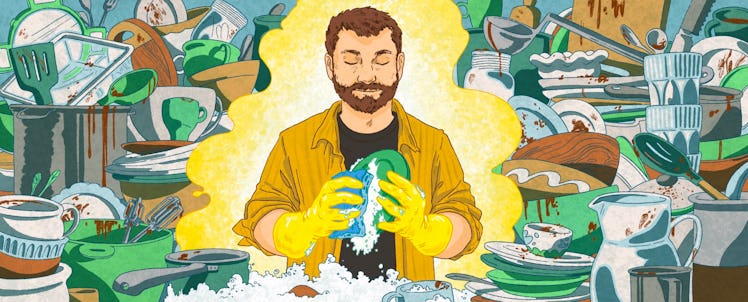Not Ready For Meditation? Dish Washing Is Your Ticket to Defeating Anxiety.
It sounds like hippy nonsense, but the path to joy runs right through the kitchen sink.

Adam Hanley didn’t like going to church growing up. Raised Methodist in the South, Hanley, now a research professor at the University of Utah, quibbled with the scripture and the priest and his parents, who got so tired of the questions they opted to furnish their son with different answers. They gave him The Miracle of Mindfulness by the Vietnamese monk Thich Nhat Hanh, a book of Buddhist and mindfulness teachings popular with people who clearly remember where they were when they found Jerry Garcia died.
The thin book is essentially a well-written suggestion that we collectively pay more attention to what we’re doing and try to take joy in it. That’s an oversimplification of course, but not much of one. And that’s also easier said than done. Consider this moment: You’re socially distanced and the anxiety around coronavirus is dancing arm in arm with the petty annoyances that come from being cooped up with wives, kids, dogs, and even yourself. Being present is a hard sell.
Then you’re there, washing the dishes, feeling the warm water and the smooth contours and familiar chips of the family dishes, and it’s okay for a second. That’s where Adam Hanley comes in.
Back in 2014, Hanley was getting his doctorate at Florida State University — not exactly the world capital of mindfulness — which meant he had access to a life skills lab that contained, among other things, a sink. He looked at the sink and thought about his grandmother, who would spend family gatherings happily washing dishes and had an idea for an experiment. Hanley randomized two groups of college kids and had half read Thich Nhat Hanh’s instructions for mindful dish-washing while the others read simple, mechanical instructions.
After the students washed the dishes, members of the group that had read mindfulness teachings reported having a better experience, a joyful experience, and had lost track of time. Hanley, a skeptic, was shocked. “No one really looks at informal mindfulness practice,” he says. “It’s prescribed and embedded in various therapeutic practices, but I was honestly surprised we found anything. The intervention was incredibly brief. There was hard fluorescent lighting. But people got a real mood bump anyway.”
“The time piece is most interesting,” Hanley adds. “Sense of time is very connected to sense of self. Folks who were mindful overestimated how long they did something that they reported being pleasant.
What did people read that turned a chore into a source of happiness? Here is Thich Nhat Hanh on dishwashing.
There are two ways to wash the dishes. The first is to wash the dishes in order to have clean dishes and the second is to wash the dishes in order to wash the dishes.… While washing the dishes one should only be washing the dishes, which means that while washing the dishes one should be completely aware of the fact that one is washing the dishes…. The fact that I am standing there and washing these bowls is a wondrous reality. I’m being completely myself, following my breath, conscious of my presence, and conscious of my thoughts and actions. There’s no way I can be tossed around mindlessly like a bottle slapped here and there on the waves.
Good writing. Good ideas. Not complicated.
So what is a person possessed of justifiable anxiety and a sink full of dirty dishes to do? Well, the dishes. But within that there’s a choice and an opportunity — a way to turn a chore into an act of mindful self-indulgence. There’s an opportunity to not be the bottle.
That said, there’s some discipline involved.
“It’s funny,” says Hanley. “I think about this study every time I do the dishes and I usually don’t follow the instructions directly. I put on music because it provides me with a moment and no one bothers me. It’s my dish force field. Out our window we can see the foothills of the Wasatch Range. That’s nice and the soap smells good.…”
Hanley trails off. The dishwashing study is a thing he did when he was a student — a nice but distant memory. He’s working on bigger things now, helping patients recover through the use of pre-surgical mindfulness interventions. But it’s nice to think about the dish washing study and the monk and the profound possibility of the banal present. It’s nice to think about washing the dishes to wash the dishes.